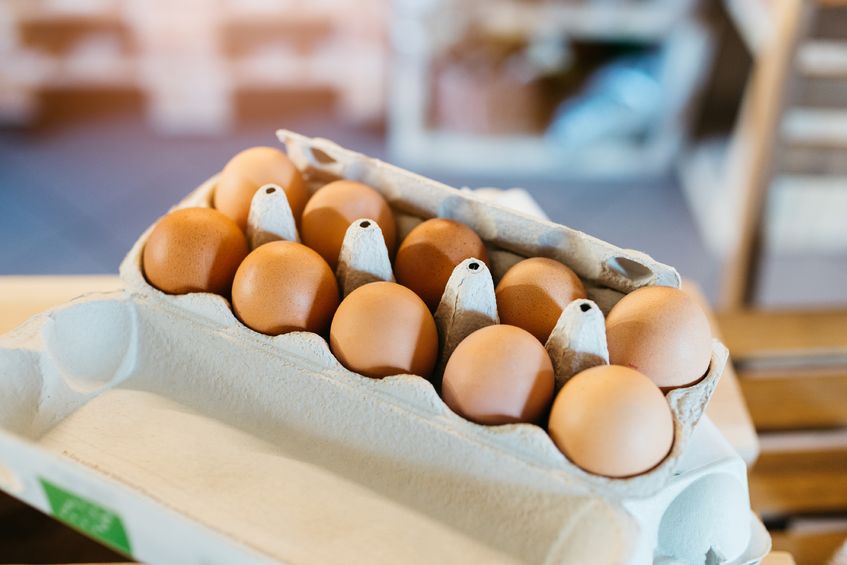
British egg industry leaders are looking into official Government figures that apparently give the false impression that production of egg products in the UK has fallen by nearly a third over the last nine months.
The figures, which have been released by Defra, suggest that production was down by more than 32 per cent over the first free quarters of 2017 compared with the same period last year. But the British Egg Industry Council (BEIC) says the figures are simply wrong.
"What they appear to have done is compare the first three quarters of this year with the whole of last year," said Mark Williams, BEIC chief executive. "We are looking into the figures. The 32 per cent figure is clearly wrong."
The Defra release shows that a total of 67,938 tonnes of products were produced by UK producers from January to September this year. Over the first three quarters of 2016, the total was 75,386 tonnes. The difference was 7,448 tonnes - a fall of 9.8 per cent year-on-year.
However, Defra puts the reduction at 32.4 per cent. The only way to achieve this result would be to include the figure for the final quarter in 2016.
'Like-with-like'
"They have not compared like with like," said Mr Williams. "They have compared three quarters of this year with the whole of last year. But we are not sure that the nine per cent figure is right either.
"It could be that a return has gone missing somewhere but we are looking into it to find out exactly what has happened," he said.
The release of the figures comes at a time when British egg processors have been pressing UK companies to switch from sourcing imported egg product.
They renewed their call to buy British product in the wake of the recent fipronil scandal when some imported products may have been contaminated with the banned chemical. Tests on UK farms showed that the British layer flock was clear of fipronil.
Ian Jones, chairman of British Lion Egg Processors, said after the fipronil scandal arose: “This is just the latest of a number of food safety issues connected to eggs produced outside of the UK in recent years.
"Consumers clearly want retailers, caterers and food manufacturers to use good quality British ingredients that are produced to high standards of food safety, but in some prepared foods this is not the case."
Sourced from overseas
Whilst major supermarkets promoted the fact that they sourced their shell eggs from British producers, food withdrawals by some supermarkets following the fipronil scandal showed that many eggs for processing were sourced from overseas.
Ian Jones accused the retailers of operating double standards. “The major retailers are operating to double standards when it comes to eggs. All of them stock British Lion shell eggs but they use imported eggs in many of their other foods containing eggs."
He said: “As we approach Brexit, shoppers are growing increasingly concerned about the ingredients used in manufactured food and now more than ever want and deserve transparency on food packaging.
“The egg industry believes that this is a great opportunity for retailers to listen to the concerns of their customers and reassure them by specifying the use of British eggs and using the ‘Made with British Lion eggs’ logo on packs.”
Increased demand
Last month Bumble Hole Foods managing director Barry Jackson told FarmingUK there was increased demand for UK egg product.
"The demand for UK, home produced is up," he said. "There is a real focus on British - where they are going to get egg from."
However, he warned that the UK egg industry had to be careful about pushing too much too quickly. "There is a danger," he said.
"Lion has to be careful because it could end up creating a demand for something that just isn't there." He said the UK currently did not have enough egg available to meet the whole needs of the UK processing sector.
The Defra statistics could add to such concerns, suggesting that production is down by a third. However, as the BEIC has pointed out, the figures are wrong.
Egg figures
The egg product figures form part of the latest quarterly egg statistics released by Defra. They show that 7.6 million cases of eggs were packed in UK egg packing stations during the third quarter of 2017.
This was a 4.8 per cent increase on the third quarter in 2016. The total included 3.7 million cases of free range eggs - an increase of just over 10 per cent on the 3.3 million cases packed in the same period last year.
Barn egg supplies halved year-on-year, from 166,000 cases to 84,000 cases. Organic numbers were up slightly from 183,000 cases in the third quarter of 2016 to 187,000 cases in the same period this year.
The Defra release also included import and export figures for August this year. Mark Williams said that BEIC would also be looking into the detail of these figures, which indicated a 100 per cent increase in shell egg imports year-on-year and an 11 per cent fall in exports. The release showed both imports and exports of shell products down year-on-year - imports by 10 per cent and exports by 17 per cent.
Mark Williams said it would probably have been too early for the product trade figures to have been impacted by the fipronil crisis. There is, however, the possibility that the fall in the value of Sterling may have affected trade.
At the annual conference of the British Free Range Egg Producers Association in October Dale Burnett, chief executive of Noble Foods, said that imports of liquid egg had started to dry up because it was more expensive to bring product into the UK.
